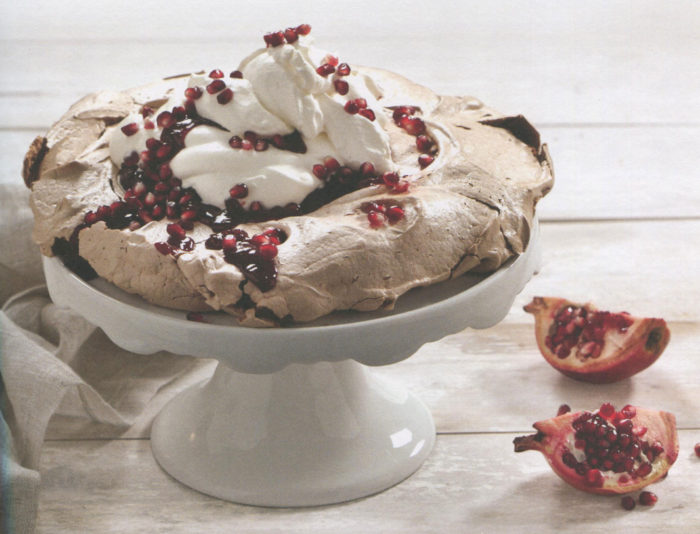
Ah, the holidays. And pomegranate season. Meringue with cocoa powder topped with pomegranate seeds and jelly. What better dessert to put next to the Thanksgiving Pumpkin pie! Here’s the recipe from 2016:
Is there an end to the wonder of meringue? I love it whether in bite-sized cookie format [like Wasp’s Nests, post to come!] or a full-scale pavlova. Here the pavlova is chocolate, but just a bit. Some cocoa powder gives color and the hint of chocolate flavor. Then we have the topping of whipped cream and pomegranate seeds. And pomegranate jelly. The recipe for jelly is in the book Wintersweet — which I encourage you to add to your library. Can’t do the pomegranate jelly? Well, experiment: apple or blackberry or raspberry will work just fine.
Chocolate Pomegranate Pavlova
Yield: one 9-inch cake
Ingredients:
For the pavlova:
- 1 cup (200 g) granulated sugar (or a scant cup of superfine or caster sugar)
- 4 large egg whites, at room temperature
- 2 tablespoons cocoa powder
- 1 teaspoon cornstarch
- 1 teaspoon balsamic vinegar
- ⅛ teaspoon ground cardamom (optional)
For the topping:
- ¼ cup Pomegranate Jelly (page 119)
- ½ pomegranate, seeded (½ cup of seeds)
- 2 cups heavy
- ⅛ teaspoon vanilla extract
- 2 teaspoons confectioners’ sugar
Preparation:
Preheat the oven to 350°F (l75°C). Trace a 7-inch (18-cm) circle on a sheet of parchment paper in heavy-handed pencil using a bowl or cake pan as a guide. Flip the parchment paper over and set it on a cookie sheet (the circle should be visible through the paper).
For the pavlova, process the granulated sugar for 60 seconds in a food processor or blender until finely ground (superfine and caster sugar require no grinding).
In the bowl of an electric mixer, beat the egg whites on medium- high speed for 3 to 4 minutes, or until they form stiff peaks that don’t droop when the beaters are lifted.
With the mixer still running, add the finely ground sugar one tablespoon at a time, beating well, until the meringue is stiff and shiny. Once all of the sugar is added, beat the meringue for 4 to 6 minutes more on medium-high speed, scraping down the sides of the bowl, or until the mixture is no longer gritty when rubbed between your fingers. The mixture should cling tightly to the bowl and feel very dense. Sift the cocoa on top. Add the cornstarch, vinegar, and cardamom, if using. Fold everything together with a rubber spatula, rotating the bowl and using light, circular strokes that lift the whites from the bottom and deposit them gently on top of the dry ingredients, until no streaks remain.
Working quickly, dab dots of the soft meringue under each corner of the parchment paper to glue it down so it doesn’t slide around annoyingly while you’re trying to work. Mound the meringue within the marked circle in a big pile. Smooth it into a circular pillow about 2 to 3 inches high with a slight depression in the middle. Don’t bother trying to make it look too perfect—it should be free-form. The batter will spread a bit during baking.
Place the pavlova in the oven and immediately turn the heat down to 300°F (l50°C). Bake for about 1 hour and 15 minutes, or until the meringue is set and crisp on the outside, but the center still feels soft underneath. Do not open the oven door until the very end. I know the suspense is killing you, but the more you check, the more it’s going to want to sink and the more you’re going to want to check it again. Where does it end? When it’s finally done, turn off the heat and let the pavlova sit in the oven, with the door propped open with a wooden spoon, to cool down slowly. Remove the pan from the oven when it is completely cool. (The pavlova can be made up to a day ahead of time. Cover it gently with plastic wrap and store it at room temperature.)
At this point, the pavlova should not look particularly pretty. It will likely be cracked and fissured like a volcanic crater, with the center threatening to collapse. All normal. When ready to serve, loosen the pavlova from the parchment paper with a spatula, and gently transfer it to a serving plate or cake pedestal.
For the topping, warm the pomegranate jelly in a microwave or in a small pot on the stove just until loose. Whisk in up to a teaspoon of warm water to loosen the jelly to a syrupy consistency. Drizzle the pomegranate syrup over the middle of the pavlova. Sprinkle half of the pomegranate seeds over the syrup.
In a medium bowl with a whisk or an electric mixer, whip the cream with the vanilla and confectioners’ sugar until soft peaks form and the cream mounds nicely in a pile, 1 to 2 minutes. Mound the cream on top of the pomegranate topping, and sprinkle with the remaining pomegranate seeds. Serve right away.
